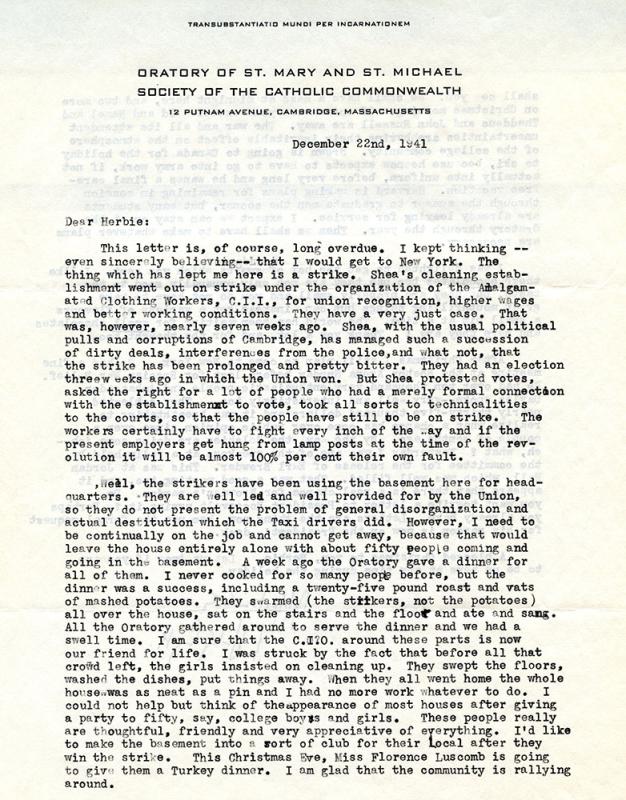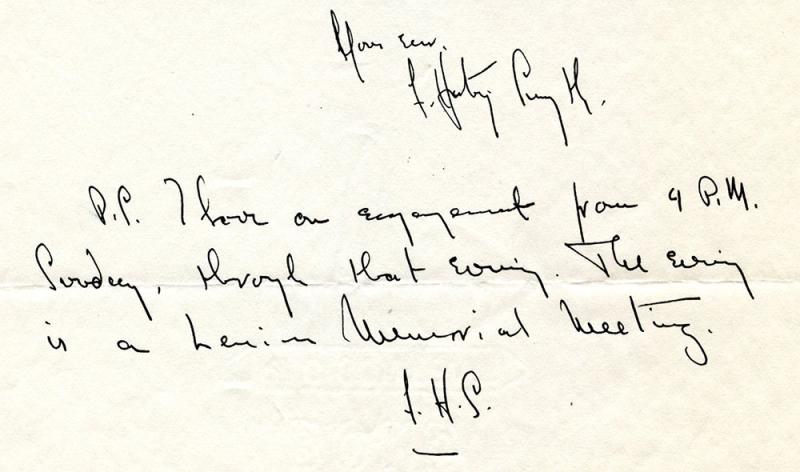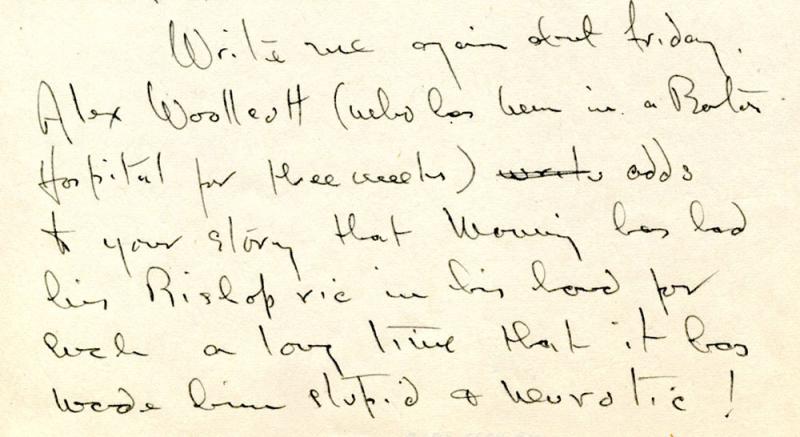
Letter from Frederic Hastings Smyth to Herbert Cahoon, Cambridge, Massachusetts, December 21, 1941. MA 4733.69:2
The Herbert Cahoon papers (MA 4733) contain a series of letters dating from 1941 to 1959 from Frederic Hastings Smyth (1888–-1960) to Herbert Cahoon, Curator of the Literary and Historical Manuscripts Department at the Pierpont Morgan Library from 1954 to 1989. Smyth was an Anglo-Catholic priest and Marxist revolutionary who was simultaneously engaged in Christian theological debate and extremist politics. A largely forgotten religious and political figure of the twentieth century, he is an example of one of the many intellectual Americans who fervently tried to make a mark on the world.
Frederic Hastings Smyth was born in Clinton, Massachusetts, into a family of local industrialists. 1 Having earned a PhD at MIT, he began his professional life as a chemist, serving in the U.S. Army for the Chemical Warfare Service during the First World War. (He designed the logo for this institution, and though it is now called the Army Chemical Corps, it retains Smyth’s design in a slightly altered form). After the war, he was distracted from life as a chemist by notions of becoming a priest, and enrolled in the General Theological Seminary in New York. He left his studies in 1925 and traveled in Europe for a time. In Europe, he encountered both fascism and communism, and grew to appreciate Catholicism while in Rome. In England, he absorbed the ideas of the Anglo-Catholic movement, re-enrolled in theological college, and was ordained into the Church of England in 1932.
Returning to the United States in 1933, he established the Oratory of St. Mary and St. Michael, Society of the Catholic Commonwealth, where he concerned himself with what he called “metacosmesis,” combining Anglican incarnationalism with Marxist dialectical materialism. Smyth had become involved with the Christian Socialist movement while still in England, when he witnessed outrageous poverty in Chichester.
Smyth became involved in workers’ movements in Massachusetts, supporting strikers under the auspices of the Amalgamated Clothing Workers, C.I.I. as seen in the letter above (MA 4733.69:2). After attending an Anglican conference in 1942, where he challenged the participants of a seminar “composed entirely of Virginians” on the subject of blood bank segregation, he wrote to Cahoon that “Christianity seems to have shown these people that it is wrong (in theory) to cling to race prejudice” (MA 4733.69:9). He attended rallies, like the one put on by the C.I.O. “for the Italians of greater Boston” on Columbus Day (MA 4733.69:11). In 1942 he attended “a Lenin Memorial Meeting” to honor the 18th anniversary of the death of Vladimir Lenin, who died on January 21, 1924. Smyth was by then under FBI surveillance for his political activities, though he was labeled “more odd than dangerous.”

Letter from Frederic Hastings Smyth to Herbert Cahoon, Cambridge, Massachusetts, January 19, 1942. MA 4733.69:4
Smyth met resistance in the Church, and his efforts were controversial. He describes a conflict with William T. Manning, Episcopal Bishop of New York from 1921 to 1946, in which the Bishop “refused flatly to license me for more than a year, implying that he would actually refuse to continue the ’experiment’ (as he was pleased to call it), no matter what.” Manning believed that the Oratory “always caused ‘trouble.’” In this letter to Cahoon (MA 4733.69:6), Smyth laments that church officials “never face you honestly, nor do they ever give you any chance to speak in your own defense or clear up situations which you alone could make clear.” In a later letter to Cahoon, he fires back at Manning by mentioning that Alexander Woollcott, American drama critic and radio personality, had told him that Manning “has had his Bishopric in his hand for such a long time that it has made him stupid & neurotic!” (MA 4733.69:9) Criticizing the Church is a common theme in Smyth’s writings to Cahoon (almost as common as requests for money for the Oratory), and he later laments the lack of class diversity at a conference and in the Church in general (MA 4733.69:8).
Smyth tried hard to spread his Christian Marxist ideas. His Society of the Catholic Commonwealth had a newsletter, as he believed people were interested in his “rather unusual combination of theological theory applied to Marxist analyses” (MA 4733.69:12). He attempted to start S.C.C. cells in New York, Montreal, and Toronto. Later in life, he expressed hope that his efforts in Asia were yielding fruit, citing “much good news from the S.C.C. in Japan” and inroads in Korea (MA 4733.69:17), though his American efforts largely failed. Cahoon seems to have become less and less involved with Smyth and the Oratory as Smyth aged, with Smyth frequently mentioning Cahoon’s lack of involvement.
Smyth died at age 71 in 1960, and though his obituary in the New York Times 2 cited “a large membership in the United States, Canada, England, Korea and Japan” for the Society of the Catholic Commonwealth, the Society held its last service in August 1967 – just seven years after Smyth’s death. Except for a few groups in Japan, the Society ceased to exist. Today, Smyth’s Anglo-Catholic Marxism has been almost entirely forgotten.

Letter from Frederic Hastings Smyth to Herbert Cahoon, Sweet Briar, Virginia, July 10, 1942. MA 4733.69:9
The Morgan is fortunate to possess this collection of letters from Frederic Hastings Smyth to Herbert Cahoon, whom Smyth addressed as “Herbie.” These letters are some of the only vestiges of Smyth’s movement, which blended theological battles with Christian and world politics. The letters reveal a man of firm convictions who struggled for his entire life to gain recognition and followers, and his efforts deserve to be remembered as a quirky but well-meaning footnote to the twentieth century.
Zachary Rosalinsky
Shelby White & Leon Levy Fellow in Manuscript Cataloging, Spring 2023
The Morgan Library & Museum
Endnotes
- Most of the biographical information on Frederic Hastings Smyth and quotations not from Morgan manuscripts provided here are derived from J. Frederick Rogers, “Man on the margin: A Christian Marxist at Hamilton” (2013) from The Hill in History. Hamilton College, Clinton, NY.
- “Rev. F.H. Smyth, 71, Of Episcopal Group.” The New York Times, April 18, 1960, page 29.
